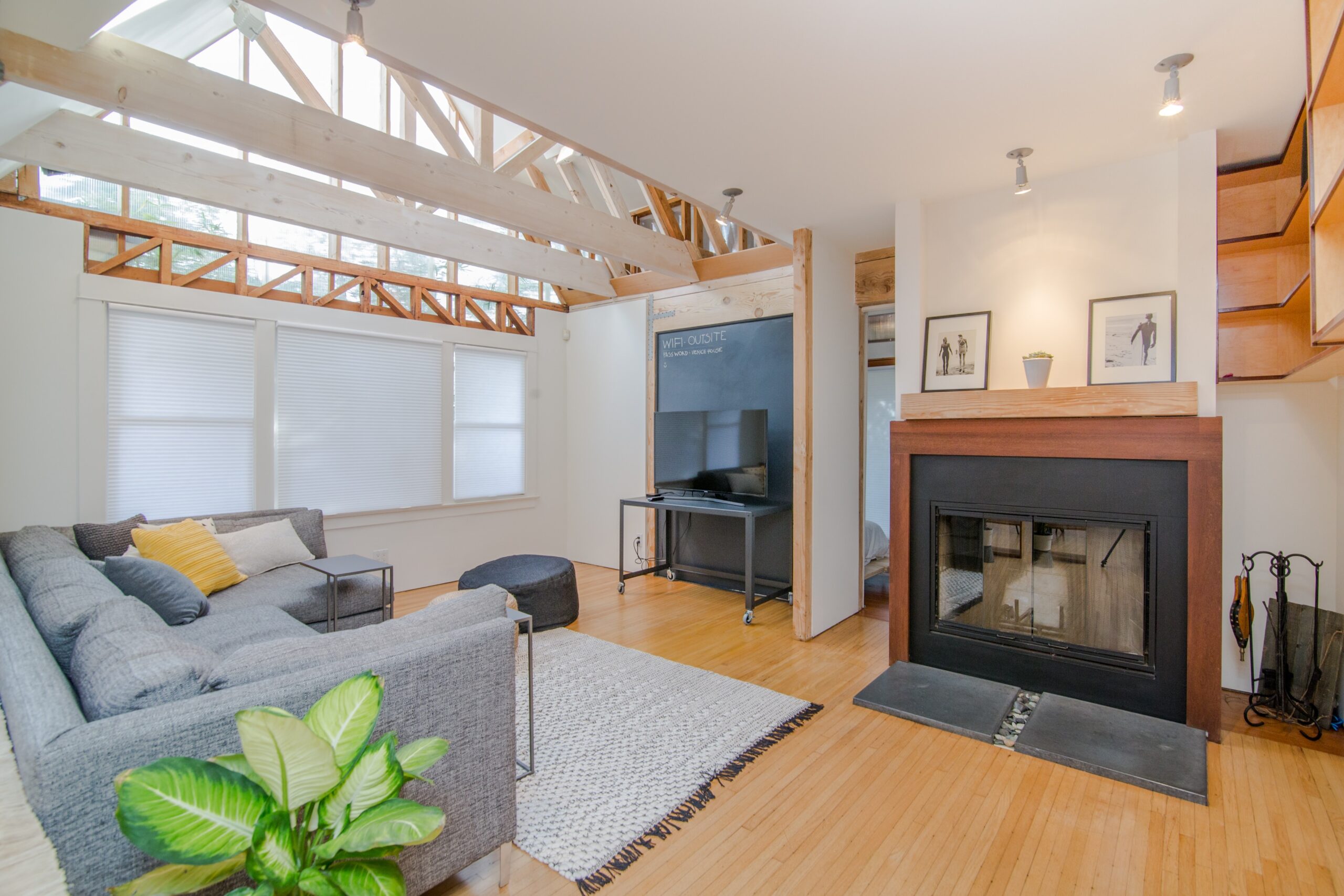Stepping into your very own home, with those keys in hand, is a moment of pure magic. It’s the space where your dreams take root and your memories start to flourish.
Yet, with great homeownership comes great responsibility. While the idea of maintenance and repairs might not have the same glitz and glamour as moving in, they are the cornerstone of safeguarding your investment. It’s the care and attention you give your home that keeps the magic alive. Think of it like going to your annual check-ups at the doctor — preventative care saves you from big headaches (and bills!) later.
5 Budget Friendly Home Maintenance Tips
To maintain your home’s longevity, create a regular maintenance routine. Check both inside and outside regularly, addressing minor issues promptly to ensure your home remains a comfortable and sheltering haven for your family. Other key steps include the following:
1. Service the HVAC System
Your home’s heating, ventilation, and air conditioning (HVAC) system works hard to keep you comfortable in every season. This complex equipment requires professional maintenance to ensure safe, efficient operation year after year. When considering potential upgrades or replacements, it might be beneficial to research the results of Heat Pump vs. Gas Furnace on the internet to determine which option best suits your home’s needs.
After evaluating the best choice for your home, it’s crucial to stay committed to routine maintenance. Schedule an annual tune-up with an HVAC technician. They will thoroughly inspect all components of your heating and air conditioning system. As technology evolves, newer options like heat pumps are gaining popularity in many homes.
This preventative maintenance helps your HVAC run more efficiently, saving on energy bills. It also catches small problems before they require major repairs. In addition to the yearly check-up, you can take a few simple steps to keep the HVAC system running smoothly, as mentioned below.
Tips to keep your system running smoothly:
- Change air filters monthly during high-usage seasons
- Clear debris and overgrowth away from outdoor AC units
- Promptly call for service if any issues arise between annual tune-ups
- Consider enrolling in a preventative maintenance plan for regular visits
- Ask your technician about possible upgrades to improve efficiency
Investing in professional HVAC maintenance is money well spent compared to the high cost of emergency repairs or having to replace the whole system. A well-maintained heating and cooling system will provide comfortable indoor temperatures year after year.
2. Check Smoke and Carbon Monoxide Detectors
Smoke and carbon monoxide (CO) detectors are essential safety devices that require simple, regular maintenance to work properly when you need them most.
Test all smoke and CO detectors monthly by pressing the test button until the alarm sounds. This ensures the audible alert functions properly in an emergency.
Replace batteries in all detectors once a year, even if they seem to be working fine. Dead batteries are the most common reason these lifesaving devices fail. Immediately swap batteries if you hear a low battery warning chirp.
In addition to fresh batteries, the detectors themselves need periodic replacement. Also, remember:
- Smoke detectors should be replaced every 10 years.
- CO detectors last 5-7 years before needing replacement.
Having adequate coverage on every level provides extra protection. Install smoke detectors outside each sleeping area and on every floor. CO detectors should be on every level and near bedrooms.
Following the manufacturer’s recommendations for monthly testing, annual battery changes, and replacement timelines ensures your smoke and CO detectors will work right when it matters most. Taking just a few minutes each month and year to maintain these devices provides peace of mind that your family will have vital early warning in case of an emergency.
3. Clean Gutters and Downspouts
Clogged gutters are a common problem that can cause a lot of trouble if left unchecked. When gutters get filled with leaves, sticks, and other debris, it prevents rainwater from properly draining away from your home. This excess moisture seeping into your roof, walls, siding, and even ceilings can lead to rot, mold growth, and deteriorating materials.
To prevent overflowing gutters, it’s essential to clean them regularly in the spring and fall when debris accumulates the most. Use a sturdy ladder to safely access the gutters. Then remove leaves, sticks, and gunk by hand or use a small trowel or a specialty gutter cleaning tool to scoop it out more quickly. Give the gutters a good rinse afterwards with a hose attachment to wash away any remaining debris.
Taking the time twice a year to thoroughly clean out your gutters is well worth it to avoid thousands in potential water damage. Clogged gutters are one of the most common and preventable causes of moisture issues. By staying on top of this routine maintenance, rainwater can properly drain away from your home. Your gutters will function smoothly, protecting your roof, siding, walls, and foundation from water damage and associated rot and mold growth.
4. Inspect and Replace Air Filters Regularly
Air filters play a critical role in maintaining good indoor air quality and allowing your HVAC system to operate efficiently. Over time, filters accumulate dust, pet dander, pollen and other debris that restricts proper airflow. This forces your HVAC system to work harder, increasing energy use, and can even cause complete breakdowns.
To prevent these problems, inspect your air filters at least monthly. For standard 1-inch filters, a good rule of thumb is replacement every 90 days. When installing a new filter, write the date on it with a permanent marker to track when your next change is due.
Tips for proper air filter care:
- Check filters monthly and replace as needed, typically every 90 days for 1-inch filters
- Note the install date on new filters to remember the replacement schedule
- Consider upgrading to a pleated filter for better airflow and filtration
- Verify filters are sized properly for your HVAC system
- Change filters more often during high-usage months or if you have pets
- Clean the filter slot before inserting a new filter
Following this simple inspection and replacement routine keeps your HVAC system performing at its best. Your home’s air stays cleaner, energy bills are lower, and you avoid expensive system breakdowns. Proper air filter maintenance is one of the easiest and most important steps for a healthy, efficient HVAC system.
5. Inspect Siding and Trim
The siding, trim, fascia and soffits on the exterior of your home should be inspected regularly to maintain curb appeal and prevent costly damage.
Examine all sides of the house every 6 months, looking closely for any cracks, peeling paint, rotting wood, mold or other signs of deterioration. Catching problems early allows for minor repairs. Ignoring issues can lead to major siding and trim replacement down the road due to water intrusion.
Tips for keeping siding and trim in good shape:
- Inspect all exterior surfaces every 6 months for damage
- Repaint worn trim and wood features to refresh protection
- Replace any rotted, warped or cracked wood
- Re-caulk around windows, doors, pipes and joints if needed
- Power wash vinyl siding every 2-3 years to remove dirt and grime
- Consider re-staining cedar shake siding every 3-5 years
- Seal any exterior holes allowing air intrusion
- Trim back bushes and trees touching the house
Conclusion
Think of your home as a precious heirloom that you want to preserve for generations to come. Just as you’d carefully clean and maintain a cherished family heirloom, your home deserves the same level of care and attention. This proactive approach not only enhances your home’s aesthetics and functionality but also secures its value over the years.
By dedicating time and effort to these maintenance tasks, you’re not only protecting your investment but also ensuring that your home remains a comfortable and secure haven for you and your family, providing peace of mind and lasting enjoyment for many years ahead.


